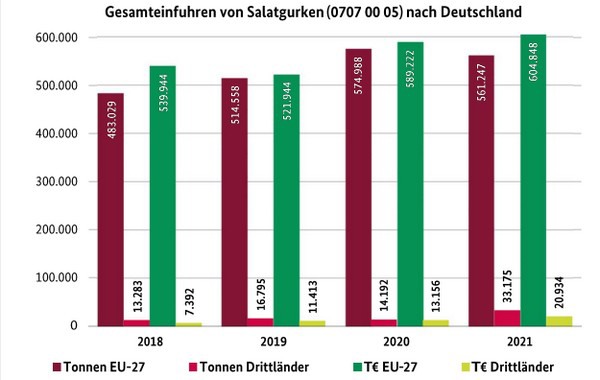Dutch, Belgian, and domestic cucumbers apparently lost importance as their season entered the home straight. In some cases, they had already been withdrawn from the market. Spanish shipments filled the gap in supply but were unable to plug the hole completely, according to the BLE. Valuations therefore jumped upwards, in some cases very significantly. In Frankfurt, they rose very sharply for Spanish offers, and Munich also reported price increases of up to 100% over the course of the week. In some cases, prices climbed several times a day. In Hamburg, traders reacted to the increased incoming demands and simply made fewer orders, as customers were very reluctant to buy at prices of up to €16 per box of 12.

Prices for mini cucumbers from Spain, Germany, and the Netherlands also rose, although nowhere near as much as for snake cucumbers.
Click here to go directly to the full market and price report.
Apples
Local varieties predominated: Elstar, Jonagold, and Wellant predominated, followed by Braeburn and Tenroy in terms of importance. In Berlin, club varieties appeared more frequently. Domestic Braeburn also arrived there in increasing numbers, which could be quickly accommodated at €0.75 per kg. Italy mainly sent Golden Delicious and Granny Smith.
Pears
Nothing fundamental had changed in the assortment: Santa Maria from Turkey and Italy, as well as Italian Abate Fetel and Williams Christ, continued to dominate. Domestic and Dutch Xenia and Conference played a larger role, while Belgian Conference and domestic Alexander Lucas played a smaller role.
Bananas
The provision was sufficiently adapted to the accommodation options. These were limited in some cases due to the public holidays or holiday periods. Prices remained constant in most cases, with only Munich recording a slight increase in prices for the first brand.
Tomatoes
Dutch and Belgian deliveries continued to dominate. Turkey was mainly involved with round tomatoes and vine tomatoes, Italy with cherry tomatoes. Shipments from Morocco had increased noticeably, with the first cherry tomatoes arriving locally. As these fruits were cheaper than the competition, they could generally be accommodated quickly.
Source: BLE
